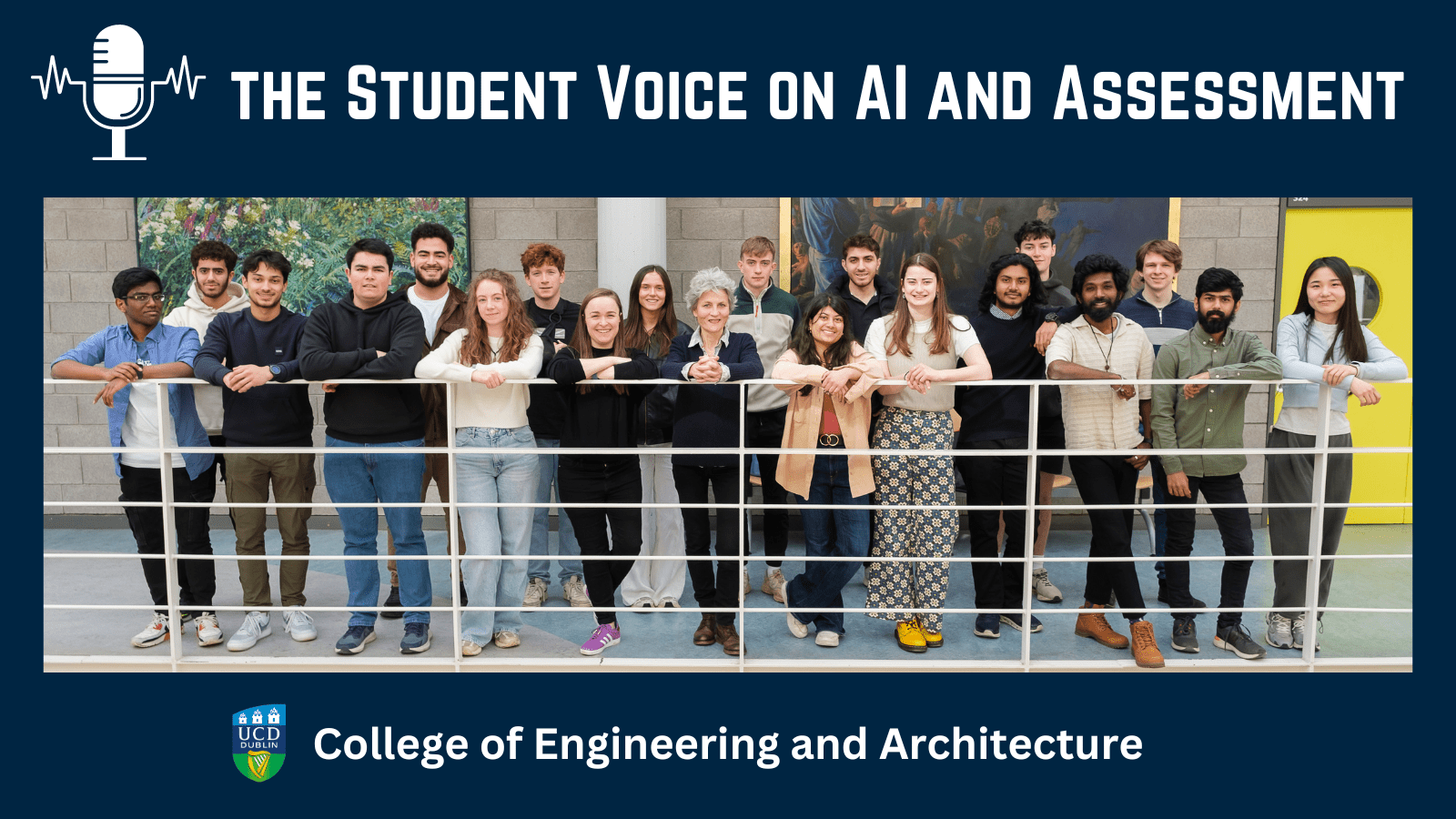Overview
Established in 2021, the University for All Faculty Partnership Programme is a collaboration between UCD Access & Lifelong Learning, UCD Teaching & Learning and UCD Equality, Diversity & Inclusion. The Programme is designed to support and accelerate the implementation of Universal Design for Learning (UDL) throughout the University. It is a structured opportunity for Faculty to undertake the Digital Badge for Universal Design in Teaching & Learning, to qualify as a UDL Facilitator, and become a role model who persuades and influences others as to the merits of inclusion for all students. Participation enables faculty to become recognised leaders in the field of access and inclusion and the implementation of Universal Design.
The Programme develops the confidence and skills of participants in order to support colleagues with the implementation of UDL and the creation of an inclusive educational environment for our diverse cohort of students. Participants share learning and experience from individual and programmatic perspectives and contribute to the further development of an inclusive university. Faculty Partners facilitate rollouts of the Digital Badge for Universal Design in Teaching & Learning.
17 Faculty Partners from across the University were appointed in June 2021 with a further 9 being appointed between November 2021 and January 2022. A collection of case studies was launched in February 2023; Learning from UDL Leaders:UCD University for All Faculty Partner Case Studies.This collection features case studies from each of the 26 University for All Faculty Partners from all six UCD Colleges. It represents a rich body of knowledge, learning and advice on embedding Universal Design across a wide variety of disciplines and contexts. It serves as an excellent practical guide for those seeking to develop Universal Design capacity both within UCD and the wider tertiary sector.
Five new Faculty Partners were appointed in April 2023:
- Dr Andrew Hines, School of Computer Science
- Professor Graeme Warren, School of Archaeology
- Dr Leila Negahdar, School of Chemistry
- Dr Sharon O'Rourke, School of Biosystems and Food Engineering
- Dr Tom McCormack, School of Physics
This extension of the Programme has been funded by the HEA’s PATH 4 Universal Design Fund. It seeks to embed Universal Design further by supporting Faculty to develop and implement projects that will audit UD and inclusive practices and measure their impact on students.
Currently, additional faculty are engaged in a module redesign project to incorporate UDL into their teaching, learning and assessment based on student feedback. Outputs from this project are ongoing in a series of case studies. These are shared below along with Faculty Partnership's creative implementation of UDL in UCD.

Jennifer Keenahan - UCD School of Civil Engineering
Explicitly wanting to tackle AI's impact on assessment practices in an innovative way, UCD Faculty Partner, Dr Jennifer Keenahan engaged students in the College of Engineering & Architecture to co-create a podcast: "Bridges and Bytes: Student Voice on AI and Assessment”. We wanted to hear what students have to say about the fact that in-person exams have made a come-back due to faculty-fears around AI-cheating. Each episode was hosted, researched and scripted by a group of engineering & architecture students. The whole project was run as an extra-curricular competition, where we provided training and supports to students on podcast production along the way. This student-driven podcast takes a deep dive into the evolving role of artificial intelligence (AI) in academic assessments, providing a unique and much-needed student perspective on the future of education. Listen now on (opens in a new window)Spotify link or (opens in a new window)Apple Podcasts.

Freda Browne & John Gilmore - UCD School of Nursing
UCD has launched the world’s first set of guidelines to support the integration of Universal Design for Learning (UDL) into clinical practice placements for nursing students. The guidelines, developed collaboratively with student partners, provide a practical framework to make practice-based learning more inclusive, accessible, and learner-centred.
Nursing students spend 50% of their programmes in practice placement sites, yet until now most approaches to UDL have focused on classroom and online learning. These new guidelines bridge that gap, offering clear recommendations for educators and clinical staff on how to create flexible, supportive, and equitable learning environments in hospitals, community settings, and specialist services.
The guidelines are structured around three principles: multiple means of engagement, multiple means of representation, and multiple means of action and expression. They include examples of inclusive approaches to mentoring, assessment, communication, and feedback, as well as strategies for responding to diverse learning needs in busy clinical environments. The resource also outlines practical steps for practice partners to embed UDL in placement planning and supervision, ensuring students feel welcomed, supported, and empowered to succeed.

Mary Farrelly - UCD School of Languages, Cultures and Linguistics
The BA International Modern Languages second-year core module, Language Skills in the Workplace, launched in Spring 2025, aiming to bridge the gap between the academic study of languages and cultures and professional opportunities. Providing students with a meaningful introduction to potential future careers, the module embeds Universal Design for Learning (UDL) principles and promotes equitable access to work-integrated learning (WIL) opportunities.
The twelve-week module consists of four thematic units exploring relevant career paths in the fields of Education, the Tech Industry, the International Community, and Translation and Interpretation. Each unit follows a predictable structure, opening with a guest speaker drawn from the programme’s own alumni network and the lecturers’ other contacts. We invite speakers to address key challenges in their fields, and this informs the simulated challenges which students work on collaboratively in the following weeks. These challenges focus on the development of soft skills such as communication, critical thinking, research, intercultural awareness, and creativity. Each challenge is presented as an enquiry-based learning activity in which students are given a role to play and a task to fulfil in the form of a ‘trigger’ simulating an authentic workplace scenario. Students have flexibility in how they engage with the trigger (ex., reading a PDF or listening to an audio file) and how they respond to the task (ex., by submitting a video, presentation, audio file, document etc.,). The online tool FeedbackFruits is used to facilitate peer-to-peer feedback and structured reflection on each challenge. This platform scaffolds group work, monitors participation, and promotes fairness and transparency by allowing students to score peers and reflect on their own contributions, addressing common group-work concerns like 'free riding’.
The module fosters social capital by connecting students with alumni and industry stakeholders, reducing reliance on existing personal networks. The module employs classroom-based simulations as an equitable alternative to external work placements, ensuring equity of access to valuable learning opportunities. Students engage in inquiry-based learning activities based on simulated, authentic workplace scenarios ('triggers'). Moreover, students are offered flexibility in how they engage with materials (e.g., reading a PDF or listening to an audio file) and how they respond to the tasks (e.g., submitting a video, presentation, or document).
The module culminates in a Mentoring Circles activity in the final week, organized in collaboration with the college’s Alumni Relations Manager, Fearghal Murphy. This activity invites recent graduates to offer students advice on careers and how to best market the skillset they have developed through their degree. The speed-dating style of the event provides an informal approach to connecting students with alumni and allows for specific Q&A on job hunting and industry practicalities. This structured alumni engagement is vital for providing real-world perspectives and maximizing student potential, further enhancing the module's commitment to equitable graduate outcomes.

Joseph Byrne - UCD School of Chemistry
Dr Joseph Byrne redesigned an inorganic chemistry module for medical students based on student feedback, using Universal Design for Learning principles to improve learning experiences. The main aim was to boost engagement by maximising chemistry’s relevance to medicine, while minimising distractions and accessibility-barriers. Building structural supports into large modules reduces needing once-off accommodations. Redesign choices included pre-scheduled communications, accessible learning materials and videos, adding assessment variety (including peer-assessment), and linking learning to student-generated examples of medicinal applications. Redesign ensured most prior critiques did not recur in post-implementation feedback. Focus group comments and a general uplift of grades largely supported positive impact of interventions.

Andrew Hines & Helard Becerra - UCD School of Computer Science
Improving Learning Engagement Opportunities through AI Abstractive Lecture Summarisation
This project focused on enhancing accessibility by providing "multiple means of representation," a core UDL principle. It investigated the use of AI models to generate abstractive text summaries of video lectures, offering students an alternative way to access content. The research study conducted subjective evaluations comparing student perceptions of AI-generated summaries against human-generated ones for readability, accuracy, usefulness and preference, while also testing AI-based tools that measure summary quality to see if they matched these human opinions. To properly evaluate their effectiveness, we applied the Quality of Experience (QoE) framework to categorise the different factors influencing the experience. Students found the AI summaries coherent, valuable, and a beneficial addition to their learning materials. The study concluded that to ensure quality, these AI-generated outputs still require curation and oversight from educators, particularly regarding technical correctness, completeness, tone and register, and overall ease of engagement. This study resulted in a research paper that is currently under review. The experiments were conducted by Muireann Walsh and Conor Fagan and the project was funded as part of the University for All Faculty Partnership Programme.